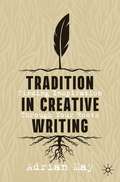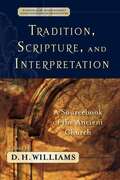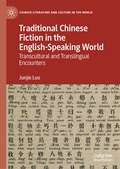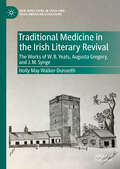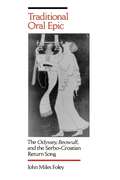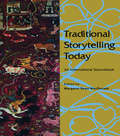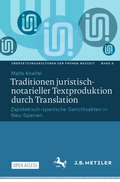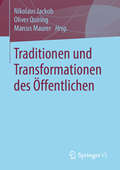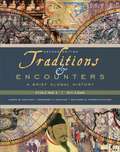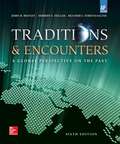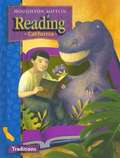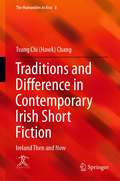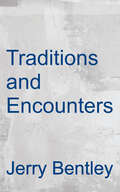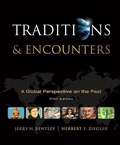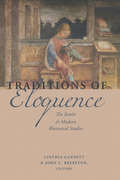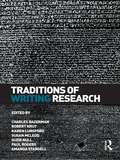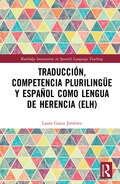- Table View
- List View
Tradition in Creative Writing: Finding Inspiration Through Your Roots
by Adrian MayTradition in Creative Writing: Finding Inspiration Through Your Roots encourages writers to rediscover sources of creativity in the everyday, showing students how to see your writing as connected to your life. Adrian May addresses a key question for many beginning writers: Where do you get your ideas from? May argues that tradition does not mean anti-progress—but is instead a kind of hidden wealth that stems from literary and historical traditions, folk and songs, self and nature, and community. By drawing on these personal and traditional wellsprings of inspiration, writers will learn to see their writing as part of a greater continuum of influences and view their work as having innate value as part of that cultural and artistic ecology. Each chapter includes accessible discussion, literary and critical readings, creative examples, and writing exercises. While the creative examples are drawn from song lyrics and poetry, the writing exercises are appropriate for all genres. Undergraduates and practitioners will benefit from this guide to finding originality in writing through exploring sources of creative inspiration.
Tradition, Scripture, and Interpretation: A Sourcebook of the Ancient Church (Evangelical Ressourcement)
by D. H. WilliamsTradition, Scripture, and Interpretation supplements a valuable series that helps modern church leaders return to the wisdom and insight of the early church fathers in order to apply their ancient understandings of Christian belief and practice to ministry in the twenty-first century. This sourcebook gathers key writings from the first through sixth centuries on various topics of concern to the church yesterday and today. The writings are arranged thematically, and within each theme, chronologically, revealing how the Christian tradition on a given topic developed over time. The anthology begins with a chapter examining the close relationship between Scripture and tradition in the minds of early church leaders.
Traditional Chinese Fiction in the English-Speaking World: Transcultural and Translingual Encounters (Chinese Literature and Culture in the World)
by Junjie LuoThis book develops interdisciplinary and comparative approaches to analyzing the cross-cultural travels of traditional Chinese fiction. It ties this genre to issues such as translation, world literature, digital humanities, book culture, and images of China. Each chapter offers a case study of the historical and cultural conditions under which traditional Chinese fiction has traveled to the English-speaking world, proposing a critical lens that can be used to explain these cross-cultural encounters. The book seeks to identify connections between traditional Chinese fiction and other cultures that create new meanings and add to the significance of reading, teaching, and studying these classical novels and stories in the English-speaking world. Scholars, students, and general readers who are interested in traditional Chinese fiction, translation studies, and comparative and world literature will find this book useful.
Traditional Medicine in the Irish Literary Revival: The Works of W.B. Yeats, Augusta Gregory, and J. M. Synge (New Directions in Irish and Irish American Literature)
by Holly May Walker-DunseithThis book explores representations of traditional medicine and healing practices in Irish Revival-era literature spanning from the late nineteenth century to the early twentieth century. Specifically, the book focuses on the work of William Butler Yeats, Lady Augusta Gregory, and John Millington Synge. The author examines folk medical practices and analyses how folk medicine appears in literature, bringing to light fresh contexts and materials including diaries, letters, folklore collections, and medical texts. By writing the first book to explore the place of traditional medicine in Irish literature, Walker-Dunseith sheds light on a distinctive area of Irish life and practice that gestures towards the possibility of a culture and nation in the act of healing itself and questioning nationalistic discourses.
Traditional Oral Epic: The Odyssey, Beowulf, and the Serbo-Croation Return Song
by John Miles FoleyJohn Miles Foley offers an innovative and straightforward approach to the structural analysis of oral and oral-derived traditional texts. Professor Foley argues that to give the vast and complex body of oral "literature" its due, we must first come to terms with the endemic heterogeneity of traditional oral epics, with their individual histories, genres, and documents, as well as both the synchronic and diachronic aspects of their poetics.Until now, the emphasis in studies of oral traditional works has been placed on addressing the correspondences among traditions—shared structures of "formula," "theme," and "story-pattern." Traditional Oral Epic explores the incongruencies among traditions and focuses on the qualities specific to certain oral and oral-derived works. It is certain to inspire further research in this field.
Traditional Storytelling Today: An International Sourcebook
by Margaret Read MacDonaldFirst Published in 1999. Routledge is an imprint of Taylor & Francis, an informa company.
Traditional and Analytical philosophy
by Tugendhat, Ernst and Gorner, P. A. Ernst Tugendhat P. A. GornerA major study of some of the central and abiding questions of metaphysics and the philosophy of language by one of the most eminent contemporary German philosophers. Originally published in 1976, it was first translated into English in 1982. Ernst Tugendhat was trained in the Heideggerian modes of phenomenological and hermeneutical thinking. Yet increasingly he came to believe that the most appropriate approach was from within the framework of analytical philosophy. This book grew out of that conviction, and as such it brought a fresh perspective to some of the rarely examined assumptions and methods of analysis. Professor Tugendhat begins by showing how semantic analysis related to such 'traditional' conceptions of philosophy as Aristotle's and Kant's, and the manner in which it treats such 'traditional' problems as being and consciousness. From these considerations he develops a systematic, thorough and original theory of reference, predication and individuation, which make it an invaluable resource for anyone with an interest in the philosophy of language.
Traditionen juristisch-notarieller Textproduktion durch Translation: Zapotekisch-spanische Gerichtsakten in Neu-Spanien (Übersetzungskulturen der Frühen Neuzeit #6)
by Malte KneifelDieses Open Access-Buch bietet eine historisch ausgerichtete Untersuchung juristisch-notarieller Dokumente aus Neu-Spanien an der Schnittstelle zwischen romanistischer Textlinguistik und Translationswissenschaft. Konkret wird ein umfassendes Korpus aus Texten der indigenen Selbstverwaltung und Rechtsprechung analysiert, die in einer peripheren Region des kolonialen Mexiko zwischen dem 17. und 18. Jahrhundert in der indigenen Sprache Zapotekisch verfasst und zur Weitergabe an die spanisch-koloniale Gerichtsbarkeit ins Spanische übersetzt wurden. Grundlage der Analyse ist ein Modell, das textlinguistische und translationswissenschaftliche Ansätze integriert, darunter das Konzept der Diskurstraditionen und die Descriptive Translation Studies. Die Untersuchung liefert Erkenntnisse über die Entstehung und Entwicklung konkreter Traditionen der Produktion von Fachtexten innerhalb eines komplexen historischen Kontextes, für die Translation sowie deren Rezeption und Antizipation einen wesentlichen treibenden Faktor darstellen. Das Buch bietet damit nicht nur eine linguistische Aufarbeitung von aus dieser Perspektive bisher wenig bearbeiteten historischen, mehrsprachigen Dokumenten der spanischen Kolonialzeit, sondern trägt auch zu einer Integration von (romanistisch-)textlinguistischen und translationswissenschaftlichen Theorien für die Anwendung in konkreten historischen Forschungen bei. Es richtet sich somit an alle am Forschungsgegenstand Interessierten sowie an Textlinguist*innen und Translationswissenschaftler*innen, die ihr Forschungsfeld an ebendieser Schnittstelle verorten.
Traditionen und Transformationen des Öffentlichen
by Marcus Maurer Nikolaus Jackob Oliver QuiringAuf nur wenige Epochen trifft das Schlagwort von der Transformation der Öffentlichkeit besser zu als auf die Gegenwart. Traditionelle Foren öffentlicher Kommunikation ändern sich und werden durch neue ergänzt. Die korrespondierenden Prozesse verändern die Teilhabe an und den Umgang mit öffentlicher Kommunikation. Es entstehen neue Herausforderungen und Probleme für die Gesellschaft und ihre Akteure. Das Buch adressiert diesen Wandel aus verschiedenen Blickwinkeln der Kommunikationsforschung. Zentrale Fragen lauten u.a.: Welche Folgen hat die Digitalisierung der öffentlichen Kommunikation? Welche Herausforderungen bringt die wachsende Polarisierung des öffentlichen Diskurses mit sich? Wie entwickeln sich soziale Wahrnehmungen und Medienwirkungsprozesse angesichts des beschriebenen Wandels? Wie passen sich gesellschaftliche Akteure an und welche Folgen hat der Wandel?
Traditions & Encounters: A Brief Global History, Volume I (2nd edition)
by Jerry H. Bentley Herbert F. Ziegler Heather Streets SalterBased on Bentley and Ziegler's best-selling, comprehensive survey text, Traditions & Encounters: A Brief Global History provides a streamlined account of the cultures and interactions that have shaped world history. An effective part structure organizes developments into seven eras of global history, putting events into perspective and creating a framework for cross-cultural comparisons, while the strong themes of traditions (the formations and development of the world's major societies) and encounters (cross-cultural interactions and exchanges) bring focus to the human experience and help turn the giant story of world history into something more manageable. With an engaging narrative, visual appeal, extended pedagogy, and a strong emphasis on critical thinking, this concise version offers enhanced flexibility and affordability without sacrificing the features that have made the complete text a favorite among instructors and students alike.
Traditions & Encounters: A Global Perspective on the Past (Sixth Edition)
by Jerry H. Bentley Herbert F. Ziegler Heather Streets-SalterConnect students to the stories of history. Connect students to the experience of history. Connect students to success in history. At McGraw-Hill, we have dedicated the past few years to deepening our understanding of student and instructor experience. Employing a wide array of research tools including surveys, focus groups, and ethnographic studies, we've identified areas in need of improvement to provide an opportunity for greater learning and teaching experiences. The fifth edition of Traditions & Encounters is a result of this. Traditions & Encounters also has a rich history of firsts: the first world history text to take a truly global perspective on the past; the first to emphasize connections among cultures; the first to combine twin themes with a seven-part framework, making the huge story of world history more manageable to both teach and learn. Now Traditions & Encounters becomes the first truly interactive world history program: one that marries groundbreaking adaptive diagnostics and interactivities with a captivating narrative and engaging visuals, creating a unique learning environment that propels greater student success and better course results. Instructors gain insight into students' engagement and understanding as students develop a base of knowledge and construct critical thinking skills. Chapter-opening vignettes and a lively narrative keep students turning the page while the adaptive questioning for each chapter and the personalized study plan for each individual student help students prepare for class discussions and course work. With its hallmark of twin themes,Traditions & Encounters continues to tell the story of the cultures and interactions that have shaped world history, while adding redesigned maps, new primary sources, and new chapter- and part-level features that strengthen connections and prompt students to analyze the events and themes in order to build a greater understanding of the past and an appreciation of history's influence on the present. Students are no longer simply reading; they are reading, interacting, and engaging in a visual, auditory, and hands-on learning experience. Give students an experience. Improve course participation and performance. Experience Traditions & Encounters, and experience success.
Traditions & Encounters: Global Perspective On The Past (AP Traditions And Encounters)
by Jerry H. Bentley Herbert F. Ziegler Heather Streets-SalterNIMAC-sourced textbook
Traditions (California)
by J. David Cooper John J. Pikulski Patricia A. AckermanNIMAC-sourced textbook
Traditions In Literature
by James E. Miller Helen Mcdonnell Russell J. HoganTraditions in Literature has four units containing short stories, poems, and nonfiction selections. Two units contain plays, one having three modern dramas and the other Julius Caesar by Shakespeare. Another unit is made up of Arthurian legends, and the eighth unit consists of two novels, The Pearl and Master and Man.
Traditions and Difference in Contemporary Irish Short Fiction: Ireland Then and Now (The Humanities in Asia #8)
by Tsung Chi ChangThis book focuses on traditions and transformations in contemporary Irish short fiction, covering pivotal issues such as gender, sexuality, abortion, the body, nostalgia, identity, and migration. In separate chapters, it introduces readers to important writers such as Maeve Binchy, Colm Tóibín, Edna O’Brien, Emma Donoghue, Gish Jen, and Donal Ryan. Given its focus, the book benefits researchers and students who are interested in Irish literature and culture, especially those who want to learn about important traditions in Irish literature, the changing face of these conventions, and the implications. The book, which received the First Book Prize 2019 awarded by The Hong Kong Academy of the Humanities, offers a unique window on Irish culture and a good read for fans of these acclaimed writers who want to learn about interesting issues concerning their short fiction.
Traditions and Encounters: A Global Perspective on the Past
by Jerry H. Bentley Herbert F. Ziegler Heather Streets-SalterTraditions & Encounters offers an inclusive vision of the global past—one that is meaningful and appropriate for the interdependent world of contemporary times. Given the diversity of human societies gathering and organizing the sheer mass of information in a meaningful way is a daunting challenge for any world history survey course. The seven-part chronological organization enables students to understand the development of the world through time while also exploring broader big-picture thematic issues in world history. <p><p>Through new and revised chapter-level and part-level features the hallmark twin themes of traditions and encounters emerge in greater clarity than ever before in this sixth edition. As a result students have resources that enable them to move beyond the facts of history and examine the past critically analyze causes and effects and recognize similarities and differences across world regions and time periods. By digging deeper into the implications of world history’s stories—not just the who the what and the where but also the why and the how—students can make sense of the human past.
Traditions and Encounters: A Global Perspective on the Past
by Jerry H. Bentley Herbert F. ZieglerThis book offers a global perspective on the past--a vision of history that is meaningful and appropriate for the interdependent world of contemporary times.
Traditions and Encounters: A Global Perspective on the Past (5th Edition)
by Jerry H. Bentley Herbert F. ZieglerConnect students to the stories of history. Connect students to the experience of history. Connect students to success in history. At McGraw-Hill, we have dedicated the past few years to deepening our understanding of student and instructor experience. Employing a wide array of research tools including surveys, focus groups, and ethnographic studies, we've identified areas in need of improvement to provide an opportunity for greater learning and teaching experiences. The fifth edition of Traditions & Encounters is a result of this. Traditions & Encounters also has a rich history of firsts: the first world history text to take a truly global perspective on the past; the first to emphasize connections among cultures; the first to combine twin themes with a seven-part framework, making the huge story of world history more manageable to both teach and learn. Now Traditions & Encounters becomes the first truly interactive world history program: one that marries groundbreaking adaptive diagnostics and interactivities with a captivating narrative and engaging visuals, creating a unique learning environment that propels greater student success and better course results. Instructors gain insight into students' engagement and understanding as students develop a base of knowledge and construct critical thinking skills. Chapter-opening vignettes and a lively narrative keep students turning the page while the adaptive questioning for each chapter and the personalized study plan for each individual student help students prepare for class discussions and course work. With its hallmark of twin themes, Traditions & Encounters continues to tell the story of the cultures and interactions that have shaped world history, while adding redesigned maps, new primary sources, and new chapter- and part-level features that strengthen connections and prompt students to analyze the events and themes in order to build a greater understanding of the past and an appreciation of history's influence on the present. Students are no longer simply reading; they are reading, interacting, and engaging in a visual, auditory, and hands-on learning experience. Give students an experience. Improve course participation and performance. Experience Traditions & Encounters, and experience success.
Traditions of Eloquence: The Jesuits and Modern Rhetorical Studies
by Cinthia Gannett and John C. BreretonThis groundbreaking collection explores the important ways Jesuits have employed rhetoric, the ancient art of persuasion and the current art of communications, from the sixteenth century to the present. Much of the history of how Jesuit traditions contributed to the development of rhetorical theory and pedagogy has been lost, effaced, or dispersed. As a result, those interested in Jesuit education and higher education in the United States, as well as scholars and teachers of rhetoric, are often unaware of this living 450-year-old tradition. Written by highly regarded scholars of rhetoric, composition, education, philosophy, and history, many based at Jesuit colleges and universities, the essays in this volume explore the tradition of Jesuit rhetorical education—that is, constructing “a more usable past” and a viable future for eloquentia perfecta, the Jesuits’ chief aim for the liberal arts. Intended to foster eloquence across the curriculum and into the world beyond, Jesuit rhetoric integrates intellectual rigor, broad knowledge, civic action, and spiritual discernment as the chief goals of the educational experience.Consummate scholars and rhetors, the early Jesuits employed all the intellectual and language arts as “contemplatives in action,” preaching and undertaking missionary, educational, and charitable works in the world. The study, pedagogy, and practice of classical grammar and rhetoric, adapted to Christian humanism, naturally provided a central focus of this powerful educational system as part of the Jesuit commitment to the Ministries of the Word. This book traces the development of Jesuit rhetoric in Renaissance Europe, follows its expansion to the United States, and documents its reemergence on campuses and in scholarly discussions across America in the twenty-first century.Traditions of Eloquence provides a wellspring of insight into the past, present, and future of Jesuit rhetorical traditions. In a period of ongoing reformulations and applications of Jesuit educational mission and identity, this collection of compelling essays helps provide historical context, a sense of continuity in current practice, and a platform for creating future curricula and pedagogy. Moreover it is a valuable resource for anyone interested in understanding a core aspect of the Jesuit educational heritage.
Traditions of Writing Research
by Paul Robert Charles Rogers Susan Karen Null Lunsford Bazerman Krut McLeod Suzie Amanda StansellTraditions of Writing Research reflects the different styles of work offered at the Writing Research Across Borders conference. Organized by Charles Bazerman, one of the pre-eminent scholars in writing studies, the conference facilitated an unprecedented gathering of writing researchers. Representing the best of the works presented, this collection focuses solely on writing research, in its lifespan scope bringing together writing researchers interested in early childhood through adult writing practices. It brings together differing research traditions, and offers a broad international scope, with contributor-presenters including top international researchers in the field The volume's opening section presents writing research agendas from different regions and research groups. The next section addresses the national, political, and historical contexts that shape educational institutions and the writing initiatives developed there. The following sections represent a wide range of research approaches for investigating writing processes and practices in primary, secondary, and higher education. The volume ends with theoretical and methodological reflections. This exemplary collection, like the conference that it grew out of, will bring new perspectives to the rich dialogue of contemporary research on writing and advance understanding of this complex and important human activity.
Traducción, competencia plurilingüe y español como lengua de herencia (Routledge Innovations in Spanish Language Teaching)
by Laura Gasca JiménezTraducción, competencia plurilingüe y español como lengua de herencia (ELH) explora las conexiones entre la ensenanza del ELH y la competencia traductora. En el libro se identifican estrategias para que las experiencias y practicas linguisticas de los estudiantes del espanol como lengua de herencia se vean representadas en el contexto de la formacion profesional de traduccion e interpretacion. Basado en un estudio empirico con estudiantes universitarios, esta monografia ofrece pautas para fomentar el desarrollo de habilidades de traduccion a partir de tres dimensiones principales: como estrategia plurilingue, actividad pedagogica y destreza profesional. Por su caracter introductorio, este libro es de particular interes para profesores e investigadores del ELH que buscan integrar de manera sistematica la practica de la traduccion en sus actividades docentes. Asimismo, los profesores de traduccion e interpretacion que deseen aprender como potenciar la mediacion como componente de aprendizaje en las habilidades de traduccion e interpretacion encontraran en esta obra numerosas sugerencias para conseguirlo. Traducción, competencia plurilingüe y español como lengua de herencia (ELH) explores the connections between Spanish heritage language (SHL) education and translation competence. The volume identifies strategies to represent the linguistic experiences and practices of SHL students in the context of professional translation and interpreting training. Based on an empirical study with undergraduate students, this monograph provides insight on how to develop translation skills in three ways: as a plurilingual strategy, a pedagogical activity, and a professional skill. Because of its introductory nature, this book is of particular interest to SHL teachers and researchers seeking to systematically integrate translation practice into their teaching. Likewise, teachers of translation and interpreting who wish to learn how to enhance mediation as a learning component in translation and interpreting skills will find numerous suggestions on how to do so in this volume.
